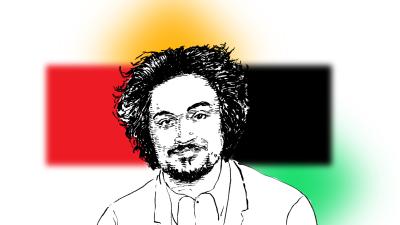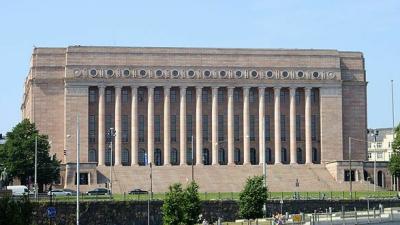Do Nazis have a right to life? Outside Germany, such a debate might seem perplexing. But during the last days of May, discussions in Germany revolved around nothing less, after a left-wing extremist was released under quite lenient conditions. She had been hunting alleged "neo-Nazis" together with a group known as the "Hammer Gang". They smashed the joints of the victims with hammers. A total of 17 real and alleged "Nazis" were hit by the group's fury. It was sufficient that one of the victims was wearing a cap from a right-wing fashion label. After seeing his skull and cheekbone fractured, the victim still has to wear a metal plate on his face to prevent him from going blind. The gang poured acid on other people.
The federal prosecutor had demanded 8 years in prison. The judge gave the extremist 5 years and 3 months. The two-and-a-half years of pre-trial detention are granted to her, the arrest warrant is put on hold - the left-wing extremist Lina E. is allowed to go home the same day. She only has to report to the police station. The judge explains that the fight against right-wing extremism is a "worthy motive". This is not only a legal, but also a moral victory for the left-wing milieu. Nevertheless: On the same evening, there were riots by left-wing extremists. "Anti-fascists" attacked police officers and caused damage to property. Arrests were made in several German cities.
For the media and politicians in Germany, this seems to be normality. The scandal lies elsewhere. Green and left-wing politicians as well as journalists see the verdict as a judicial scandal, as for them, the judgement still seems too harsh. As with the verdict, the conviction prevails that the end justifies the means; anti-fascism is not a crime. The author of a public television magazine had the temerity to say that, anyway, one can protect oneself very easily from left-wing extremist violence if one is not a Nazi.
The case throws a telling light on the moral state in the first quarter of the current century. Admittedly, right-wing extremist violence is a real phenomenon. But while there is a "fight against the right" in Germany, a "fight against the left" does not exist to this day. And if a conservative author were to write or speak in the same style as some leftists nonchalantly do, he would perish under the drumfire of media and politics. The left confirms what has so far remained unspoken: Yes, for them, there is “lebensunwertes Leben” (“life unworthy of life”; a Nazi term), namely if one does not follow their ideology. Because nowadays, "Nazi" does not only refer to the real neo-Nazi in Springer boots: for a significant part of society’s “juste milieu”, it has become a label attached to more and more Germans since the late 2000s.
Regrettably, totalitarian tendencies have never disappeared since they reared their ugly head in the form of the socialist or national socialist regimes - this is the banal as well as sinister lesson of this tragedy. But even more lurks beneath the surface. With the fall of the Soviet Union, people believed themselves to be the victors of history. There is a justified complaint that exaggerated individualism, egocentrism and self-actualisation account for a considerable part of the West's crisis. Paradoxically, however, the West suffers not only from too much individualism, but also from too little. The individual is more threatened today than ever before - how else would one get the idea that an individual loses his or her right to bodily integrity if a collective decides otherwise?
This paradox can be explained historically not least by the fact that the overemphasis on the individual is inherent in liberalism, which today shapes social and political thinking in various shades. However, socialism, which emphasises the collective and the subordination of the individual, is not a theory that fell from the sky, but which emerged from liberalism; it has only discarded the emphasis on freedom in favour of the emphasis on equality. And very obviously, today, we live in neither pure liberalism nor pure socialism, but in a chimerical hybrid that all too often combines only the most negative aspects of both.
Already in the French Revolution, we thus see all political programmes, all ideologies and all errors laid down. Only a few years after the proclamation of inalienable human rights, they came under the axe of the guillotine. Individualism inevitably leads to collectivism, because the individual is more in need of a superordinate force than ever before. The middle ground between radical individualism and radical collectivism, the Christian family, disappears after having been the preserving force of ancient Europe for centuries. Conservatives have therefore always placed the family, not the state, at the centre of their politics.
Right-wing extremists are therefore in many senses not the heirs of the royalists of that time; rather, like left-wing extremists, they continue to be bearers of the revolutionary programme and must thus be located on the side of the Jacobins. They will use any means to fulfil their own mission; the higher goal justifies lies and violence. The Christian traditionalist, like Thomas Aquinas, will prefer the common good to self-interest; in contrast to the ideologically radicalised, however, man as the image of God will never lose his traditional value, whereas the supposed human rights activists are quick to discredit their enemies as outlaws.
What we are therefore witnessing, not only in Germany but throughout Europe, is a remarkable reversal of moral Western achievements. It was Christianity that was the foundation of slave liberation not only in Europe but throughout the world, because the idea that human beings could be mere objects seemed monstrous to it. Christian abolitionists therefore soon intervened even in Africa to disempower slaveholding states. The Enlightenment merely adopted this belief and secularised it. This achievement is often left out in favour of a purely colonialist narrative that sees only the Western exploitation of the world, not the fact that parts of it often suffered from even more inhumane forms of government before the arrival of Westerners.
In the wake of the migration crisis in 2015, philosopher Chantal Delsol rightly noted that Europe's belief in the individual creates a dilemma. There was a similar moral question in the context of the hybrid attacks by Russia and Belarus, which saw the Polish border stormed with migrants especially flown in for that purpose. And the current Italian government has to put up with the question, especially from the right, why it does not take more rigid action against illegal landings in the Mediterranean.
The crux of the matter is: in each of these cases, all conservative governments have a hard time because they have to weigh the rights of the individual against the rights of the community. In contrast, a section of precisely that German left which usually claims to occupy the moral und humanist high ground is making things very easy for itself: Whenever it suits them, they dehumanise the individual.
Read also
The Finnish election is a signal for European conservatives
Sanna Marin is history. This is not without irony: usually, it is the "woke" young generation that overturns monuments to great historical figures. Yet this time, with Marin, a left-wing icon only 37 years old is toppling. She was a figurehead even in the liberal camp.
Marco Gallina
A green economy minister threatens a touristic nature paradise
Rügen is a place of romantic longing for many Germans. Today, the largest island in the republic has primarily the reputation of a tourist resort, seaside place and nature reserve. And one artistic vision of it remains especially vivid in the German soul: a romantic painting by Caspar David Friedrich, the chalk cliffs in which have etched themselves into our memory.
Marco Gallina
The AfD: Caught between Realpolitik and Dreaming
Things are actually going well for the AfD. The right-wing nationalist party is soaring in the polls and is potentially the third strongest party in the country. It has had to do little to achieve this.
Marco Gallina
The Question of Oriental Christians is a European Question
Europe will be Christian again, or it will no longer be at all. How Christian it truly is, is also shown by how much it stands by its fellow Christians. In the case of Christianity in the Orient, the very region of origin of the religion that had made Europe what it was and what it is now - things look bleak.














Comments (0)